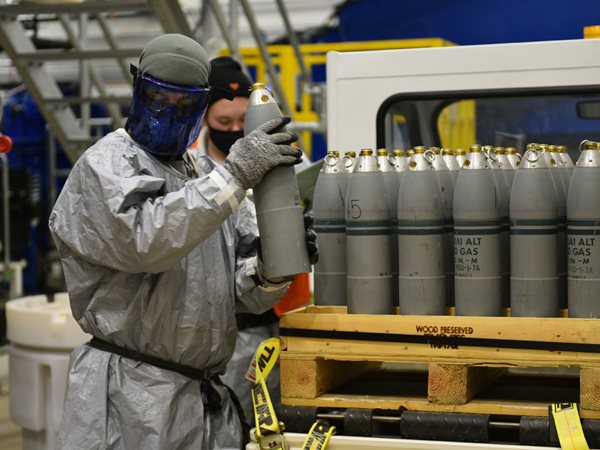05/03/2022 Stati Uniti, Colorado, Pueblo
“If you ever come across anything suspicious like this item, please do not pick it up, contact your local law enforcement agency for assistance”
The Pueblo Chemical Agent-Destruction Pilot Plant (PCAPP) team has announced the start of its final chemical weapons destruction campaign through operation of a Static Detonation Chamber (SDC) complex that will destroy decades-old munitions such as 4.2-inch mortar rounds containing mustard agent. The Pueblo, Colorado-based plant has been safely destroying chemical weapons stored at the U.S. Army Pueblo Chemical Depot since 2015. “Safe elimination of the Pueblo stockpile helps the U.S. government meet its international obligations and removes a threat from the community,” said Mike Costas, general manager of Bechtel’s Defense & Space business line. “We’re honored to continue this important mission.” The final campaign will be conducted in three armored, stainless steel vessels called Static Detonation Chambers. The electrically heated vessels detonate the munitions to destroy the agent and munitions components, and gases are treated by a pollution abatement system. “After years of work and preparation in getting the SDC units up and running, it is gratifying to be on our way with destruction of the third and final campaign,” said Todd Ailes, project manager, Bechtel Pueblo Team. “We are making our community safer with every munition we destroy.” In 1997, a presidential directive and the ratification of the Chemical Weapons Conventions, an international treaty to destroy chemical weapons, called on all member nations to destroy their chemical weapons and production facilities. Bechtel leads the teams under contract to the Pentagon’s Program Executive Office, Assembled Chemical Weapons Alternatives to help the United States complete its treaty obligations. The remaining weapons are stored at the U.S. Army Pueblo Chemical Depot in Colorado and the Blue Grass Army Depot near Richmond, Kentucky. The stockpile sites in Colorado and Kentucky account for the last 10% of what was originally a national stockpile of more than 30,000 tons of chemical weapons at seven sites. The Colorado and Kentucky projects used a combination of first-of-a-kind neutralization processes in their main plants and static detonation chambers for problematic munitions.
Photo-Source:bechtel.com
If you find anything that appears to be an explosive device, do not touch it, leave it where it is and call the police. We will contact the appropriate agencies to properly dispose of the item.
Dear editors, Biography of a bomb is aimed at highlighting the danger caused by unexploded bombs. Moreover, the most important aspect is that we work completely non profit, raising awerness about this topic is what drives us. We apologize if we make use of pictures in yours articles, but we need them to put a context in how findings are done. We will (and we always do) cite source and author of the picture. We thank you for your comprehension.





